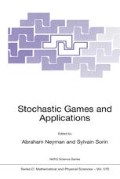Abstract
A stochastic game is a multi-stage game played in discrete time where, at each stage, the stage game played depends upon a parameter called state. The value of the state evolves as a function of its current value and the actions of the players. Let I be the finite set of players and S be the set of states. For each state z in S, an I-player normal form game is specified by action sets A i(z) for each player i in I and reward functions r i(z,.), i in I, from the set of action profiles at z, A (z) = Π iɛI A i(z) to the reals, ℝ. In addition, for any pair consisting of a state z in S and an action profile a in A(z), a probability p(.|z,a) on S describes the random transition.
Access this chapter
Tax calculation will be finalised at checkout
Purchases are for personal use only
Preview
Unable to display preview. Download preview PDF.
Reference
Aumann, R.J. (1964) Mixed and behavior strategies in infinite extensive games, in M. Dresher, L.S. Shapley and A.W. Tucker (eds.), Advances in Game Theory, Annals of Mathematics Studies 52, Princeton University Press, Princeton, NJ, pp. 627–650.
Aumann, R.J. and Maschler, M. (1995) Repeated Games with Incomplete Information (with the collaboration of R. E. Stearns), MIT Press, Cambridge, MA.
Blackwell, D. (1962) Discrete dynamic programming, Annals of Mathematical Statistics 33 719–726.
Coulomb, J.-M. (2003) Absorbing games with a signalling structure, in A. Ney-man and S. Sorin (eds.), Stochastic Games and Applications, NATO Science Series C, Mathematical and Physical Sciences, Vol. 570, Kluwer Academic Publishers, Dordrecht, Chapter 22, pp. 335–355.
Dubins, L.E. and Savage, L.J. (1976) Inequalities for Stochastic Processes: How to Gamble if You Must, Dover, Mineola, NY.
Everett, H. (1957) Recursive games, in M. Dresher, A.W. Tucker and P. Wolfe (eds.), Contributions to the Theory of Games, Vol. III, Annals of Mathematics Studies 39, Princeton University Press, Princeton, NJ, pp. 47–78.
Filar, J. and Vrieze, O.J. (1997) Competitive Markov Decision Processes, Springer-Verlag, Berlin.
Kohlberg, E. (1974) Repeated games with absorbing states, Annals of Statistics 2, 724–738.
Kuhn, H.W. (1953) Extensive games and the problem of information, in H.W. Kuhn and A.W. Tucker (eds.), Contributions to the Theory of Games, Vol. II, Annals of Mathematics Studies 28, Princeton University Press, Princeton, NJ, pp. 193–216.
Lehrer, E. and Sorin, S. (1998) e-consistent equilibrium in repeated games, International Journal of Game Theory 27, 231–244.
Maitra, A. and Sudderth, W. (1996) Discrete Gambling and Stochastic Games, Springer, Berlin.
Maitra, A. and Sudderth, W. (2003) Stochastic games with lim sup payoff, in A. Ney–man and S. Sorin (eds.), Stochastic Games and Applications, NATO Science Series C, Mathematical and Physical Sciences, Vol. 570, Kluwer Academic Publishers, Dordrecht, Chapter 23, pp. 357–366.
Maitra, A. and Sudderth, W. (2003) Stochastic games with Borel payoffs, in A. Ney-man and S. Sorin (eds.), Stochastic Games and Applications, NATO Science Series C, Mathematical and Physical Sciences, Vol. 570, Kluwer Academic Publishers, Dordrecht, Chapter 24, pp. 367–373.
Mertens, J.-F., Sorin, S. and Zamir, S. (1994) Repeated games. CORE Discussion Papers 9420, 9421, 9422, Université Catholique de Louvain, Louvain-la-Neuve, Belgium.
Ney–man, A. (2003) Stochastic games: Existence of the minmax, in A. Ney–man and S. Sorin (eds.), Stochastic Games and Applications, NATO Science Series C, Mathematical and Physical Sciences, Vol. 570, Kluwer Academic Publishers, Dordrecht, Chapter 11, pp. 173–193.
Nowak, A.S. (2003) Zero-sum stochastic games with Borel state spaces, in A. Ney-man and S. Sorin (eds.), Stochastic Games and Applications, NATO Science Series C, Mathematical and Physical Sciences, Vol. 570, Kluwer Academic Publishers, Dordrecht, Chapter 7, pp. 77–91.
Puterman, M. (1994) Markov Decision Processes, Wiley, New York.
Raghavan, T.E.S. (2003) Finite-step algorithms for single-controller and perfect information stochastic games, in A. Ney–man and S. Sorin (eds.), Stochastic Games and Applications, NATO Science Series C, Mathematical and Physical Sciences, Vol. 570, Kluwer Academic Publishers, Dordrecht, Chapter 15, pp. 227–251.
Shapley, L.S. (1953) Stochastic games, Proceedings of the National Academy of Sciences of the U.S.A. 39, 1095–1100 (Chapter 1 in this volume).
Sorin, S. (2003) Discounted stochastic games: The finite case, in A. Ney–man and S. Sorin (eds.), Stochastic Games and Applications, NATO Science Series C, Mathematical and Physical Sciences, Vol. 570, Kluwer Academic Publishers, Dordrecht, Chapter 5, pp. 51–55.
Sorin, S. (2003) Stochastic games with incomplete information, in A. Ney–man and S. Sorin (eds.), Stochastic Games and Applications, NATO Science Series C, Mathematical and Physical Sciences, Vol. 570, Kluwer Academic Publishers, Dordrecht, Chapter 25, pp. 375–395.
Sorin, S. (2003) The operator approach to zero-sum stochastic games, in A. Ney-man and S. Sorin (eds.), Stochastic Games and Applications, NATO Science Series C, Mathematical and Physical Sciences, Vol. 570, Kluwer Academic Publishers, Dordrecht, Chapter 27, pp. 417–426.
Vrieze, O.J. (2003) Stochastic games, practical motivation and the orderfield prop-erty for special classes, in A. Ney–man and S. Sorin (eds.), Stochastic Games and Applications, NATO Science Series C, Mathematical and Physical Sciences, Vol. 570, Kluwer Academic Publishers, Dordrecht, Chapter 14, pp. 215–225.
Author information
Authors and Affiliations
Editor information
Editors and Affiliations
Rights and permissions
Copyright information
© 2003 Springer Science+Business Media New York
About this paper
Cite this paper
Sorin, S. (2003). Classification and Basic Tools. In: Neyman, A., Sorin, S. (eds) Stochastic Games and Applications. NATO Science Series, vol 570. Springer, Dordrecht. https://doi.org/10.1007/978-94-010-0189-2_3
Download citation
DOI: https://doi.org/10.1007/978-94-010-0189-2_3
Publisher Name: Springer, Dordrecht
Print ISBN: 978-1-4020-1493-2
Online ISBN: 978-94-010-0189-2
eBook Packages: Springer Book Archive

